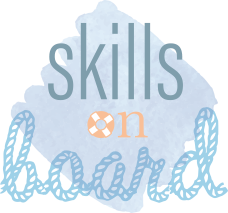4. Dealing with ‘difficult’ people
November 21, 20196. Team Working
November 21, 2019
Verbal communication skills
Verbal communication is about speaking/talking. Some good tips to enhance your verbal communication are:
• speak clearly and distinctly, avoid running words together, mumbling, talking too fast or too slow, too softly or too loudly,
• use correct, standard language rather than slang or casual expressions,
• make eye contact to show your interest,
• think before you speak,
• be concise,
• ask relevant questions, use open-ended instead of close-ended questions,
• speak with confidence,
• use a friendly tone,
• be tolerant, avoid complaining and arguing, and
• eliminate distracting physical habits.
An open (or open-ended) question versus closed-ended questions encourages the person to take control of the direction of the conversation. An open question invites a more open conversation. With open-ended questions, you set an interested, open, collaborative tone. Open-ended questions are those beginning with “What,” “How,” “In what way,” and “Tell me …” or “Describe…”. Use these to open conversation about the tourist’s expectations/views. Pause after each question to give the person time to respond.
Since you will have various types of guests from different cultures and with different everyday habits it is very important to focus on quality reception of information. Always check if you have understood each other well. Your clients must feel that their questions are both understood and answered to their satisfaction because they are not paying for boat accommodation only but also for your service. So it is important to always be polite, patient, concise, clear and confident and try to ensure that your clients understand what you want to communicate with them. In your verbal communication avoid being judgmental or leading or sarcastic. To leave good first impressions, it is crucial that you warmly welcome guest on board with a positive attitude.
Listening skills
As it is important to be skilled in talking to your passengers on board, equally important is to know how to listen. Listening to others requires focus and concentration effort, both mental, and physical, as well.
“The most basic and powerful way to connect to another person is to listen. Just listen. Perhaps the most important thing we ever give each other is our attention.” (dr. Rachel Naomi Remen).
Follow these 10 steps by Dianne Schilling to become a good listener and ease yourself and your clients in the process of communication:
• Face the speaker and maintain eye contact.
• Be attentive, but relaxed.
• Keep an open mind.
• Listen to the words and try to picture what the speaker is saying.
• Don’t interrupt and don’t impose your “solutions.”
• Wait for the speaker to pause to ask clarifying questions.
• Ask questions only to ensure understanding.
• Try to feel what the speaker is feeling.
• Give the speaker regular feedback.
• Pay attention to what isn’t said—to nonverbal cues.
Persuasion/influencing skills
After establishing a quality communication with your clients you need to make them trust you. Influencing/persuasion skills can help you with that. For example, your clients saw on the internet a beautiful beach where they want to go. But, you know that in reality, that beach doesn’t look so attractive and you would like to take them to another, much nicer, hidden beach, for which very few people know. You can use these three tactics to persuade them:
1. The Head: Logical influencing tactics address people rationally or intellectually. Arguments and information such as facts and figures are brought forward in the best interest of the organization, the team, or the person.
2. The Heart: Emotional influencing tactics connects the communication or decision to a person’s feelings of wellbeing or sense of belonging. The leader appeals to attitudes, values, a common purpose, ideals, and beliefs through inspiration or enthusiasm.
3. The Hands: Cooperative influencing tactics involves seeking advice and offering assistance. The leader reinforces the connection that they have with the others. Collaborating to accomplish a mutually important goal extends a hand to others.
Case study
Clients from a foreign country and different culture rented a boat with a skipper. They kept their side and did not communicate with the skipper at all or only if necessary.
Positive outcome: skipper approached them in a polite and friendly manner and started a conversation by asking them about their country, culture and reasons for visiting this place. He tried to motivate them by describing some of the attractions in destinations they had planned to visit during the yacht trip. After a while, they established a very relaxing and comfortable atmosphere on the boat.
Negative outcome: skipper also kept her/his side and didn’t want to interfere the clients so they missed learning about the culture, attractions and local life what they could have heard from skipper and what could increase their sailing experience.
An explanatory video
Lessons learned
We can conclude that having interpersonal skills, especially verbal, listening and persuasion skills can increase the satisfaction of your guests onboard and ease your daily work. Be always aware that each guest may communicate and react differently so you must strengthen your skills to be well prepared for every situation. To do that you must invest a lot of effort into your communication skills and carefully listen to what your clients want and need.
Verbal skills:
- Speak clear.
- Use correct, standard language.
- Make eye contact.
- Think before you speak.
- Be concise.
- Ask relevant questions.
- Speak with confidence.
- Use a friendly tone.
- Eliminate distracting physical habits.
Listening skills:
- Face the speaker and maintain eye contact.
- Be attentive, but relaxed.
- Keep an open mind.
- Listen to the words and try to picture what the speaker is saying.
- Don’t interrupt and don’t impose your “solutions.”
- Wait for the speaker to pause to ask clarifying questions.
- Ask questions only to ensure understanding.
- Try to feel what the speaker is feeling.
- Give the speaker regular feedback.
- Pay attention to what isn’t said—to nonverbal clues.
Tactics for persuasion:
- The heart
- The head
- The hands





